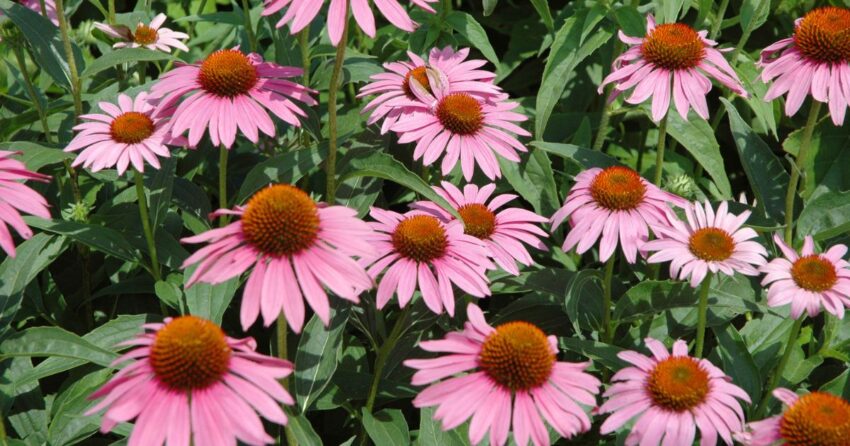Echinacea, commonly known as the purple coneflower, is a remarkable medicinal herb that has been revered for centuries for its healing properties. This robust perennial plant is not only a beautiful addition to any garden but also offers numerous health benefits. In this article, we will explore 15 compelling reasons why you should consider growing echinacea and provide you with valuable insights on how to cultivate and harness the potential of this incredible herb.
-
Boosts Immune System Function
Echinacea is widely celebrated for its ability to enhance the immune system. Its bioactive compounds, including alkamides, polysaccharides, and flavonoids, stimulate the production of immune cells, such as white blood cells, helping your body fight off infections more effectively.
-
Fights the Common Cold and Flu
Studies have shown that echinacea can reduce the severity and duration of cold and flu symptoms. By stimulating immune activity, this herb can help alleviate symptoms like congestion, sore throat, and fatigue, allowing you to recover more quickly.
-
Acts as a Natural Antibiotic
Echinacea possesses powerful antimicrobial properties, making it a natural alternative to antibiotics. It can effectively combat bacterial and viral infections, including respiratory tract infections, urinary tract infections, and even certain types of fungal infections.
-
Reduces Inflammation
The anti-inflammatory properties of echinacea make it a valuable ally in managing chronic inflammatory conditions, such as rheumatoid arthritis and inflammatory skin conditions like eczema. Regular consumption or topical application of echinacea can help alleviate inflammation and associated discomfort.
-
Supports Wound Healing
Echinacea promotes wound healing by stimulating collagen production and enhancing the activity of immune cells at the site of injury. Applying echinacea topically or consuming it internally can accelerate the healing process for cuts, burns, and other skin injuries.
-
Eases Allergies
If you suffer from seasonal allergies or hay fever, echinacea may offer significant relief. By modulating the immune response, this herb helps reduce allergy symptoms, such as sneezing, itching, and congestion.
-
Relieves Pain and Discomfort
The analgesic properties of echinacea make it an excellent natural remedy for pain relief. It can help alleviate headaches, toothaches, and muscle or joint pain, offering a gentle alternative to conventional painkillers.
-
Combats Anxiety and Stress
Echinacea has adaptogenic properties, meaning it helps the body adapt to stress and promote overall well-being. It can reduce anxiety, calm the nervous system, and enhance resilience in the face of stressors.
-
Supports Heart Health
Research suggests that echinacea may help improve heart health by reducing cholesterol levels and supporting healthy blood pressure. By enhancing cardiovascular function, this herb can contribute to overall heart health and reduce the risk of cardiovascular diseases.
-
Enhances Mental Clarity and Focus
Consuming echinacea regularly may enhance mental clarity and focus. Its immune-boosting properties and ability to reduce inflammation in the brain can promote cognitive function, memory, and overall brain health.
-
Aids Digestive Health
Echinacea has been used traditionally to support digestion and alleviate gastrointestinal issues. It can help soothe stomach discomfort, reduce inflammation in the digestive tract, and promote overall digestive wellness.
-
Promotes Skin Health
Echinacea’s anti-inflammatory and antioxidant properties extend to skincare. It can help soothe skin irritations, reduce acne, and promote a healthy complexion. Incorporating echinacea extracts or oils into your skincare routine can be highly beneficial.
-
Cultivates a Beautiful Garden
Beyond its medicinal properties, echinacea is a visually stunning addition to any garden. Its vibrant purple, pink, and white flowers attract bees, butterflies, and other pollinators, contributing to a thriving ecosystem.
-
Low-Maintenance and Hardy
Echinacea is a low-maintenance plant that can thrive in various soil types and climates. It is resistant to pests and diseases, making it an ideal choice for both experienced gardeners and beginners.
-
Sustainable and Cost-Effective
Growing your own echinacea allows you to have a sustainable and cost-effective supply of this remarkable herb. You can harvest the flowers and roots to make teas, tinctures, or herbal remedies, ensuring a readily available source of natural medicine.
How to Grow Echinacea
- Choose the Right Variety: Select a variety of echinacea that suits your climate and desired aesthetic. Common types include Echinacea purpurea, Echinacea angustifolia, and Echinacea pallida.
- Find the Ideal Location: Echinacea thrives in full sun but can tolerate partial shade. Ensure the planting area has well-drained soil to prevent root rot.
- Prepare the Soil: Amend the soil with organic matter, such as compost, to improve drainage and fertility.
- Planting: Sow echinacea seeds directly into the soil in the spring or fall, or start seeds indoors 6-8 weeks before the last frost. Alternatively, purchase seedlings from a nursery for transplanting.
- Watering and Maintenance: Echinacea is drought-tolerant but benefits from regular watering during dry spells. Remove weeds regularly to prevent competition.
- Harvesting: Harvest echinacea flowers when they are in full bloom. For medicinal purposes, dig up the roots in the fall after a few years of growth.
- Drying and Storing: Dry the flowers and roots in a well-ventilated area and store in airtight containers in a cool, dark place.
Conclusion
Growing echinacea offers a myriad of benefits, from enhancing immune function and reducing inflammation to supporting heart health and promoting skin wellness. This versatile herb not only provides an abundance of medicinal uses but also adds beauty to your garden. By following the simple guidelines for cultivation, you can harness the remarkable power of echinacea and unlock its potential for improved health and well-being.
Remember, before incorporating echinacea into your healthcare routine, it is advisable to consult with a healthcare professional or herbalist to ensure it is suitable for your specific needs and any existing medical conditions.

